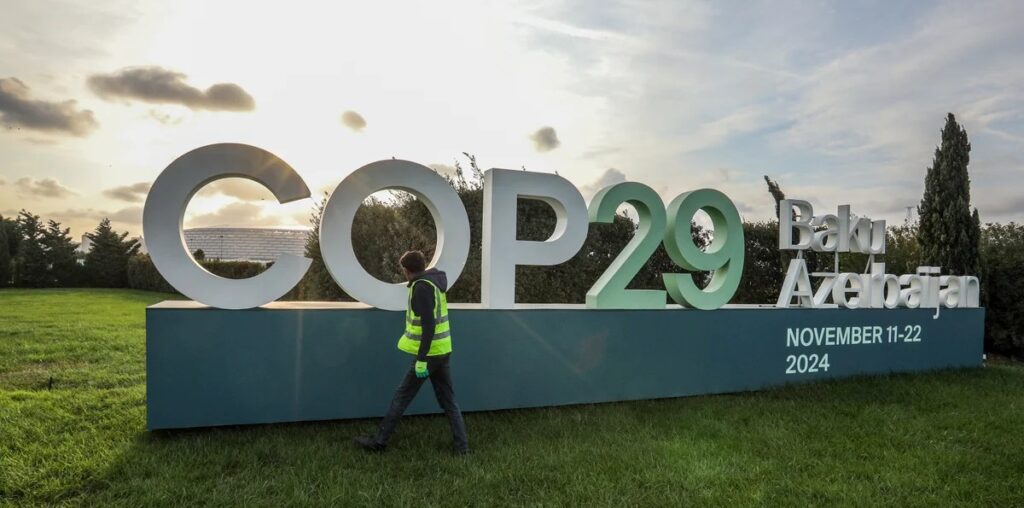 The 29th United Nations Climate Change Conference (COP29), held in Baku, Azerbaijan, aimed to advance global commitments to address the climate crisis but became enmeshed in controversies over repression, geopolitical tensions, and accusations of hypocrisy. The Azerbaijani government’s actions against climate activists and the political backdrop of the event have raised pressing concerns about the inclusivity and effectiveness of such forums.
The 29th United Nations Climate Change Conference (COP29), held in Baku, Azerbaijan, aimed to advance global commitments to address the climate crisis but became enmeshed in controversies over repression, geopolitical tensions, and accusations of hypocrisy. The Azerbaijani government’s actions against climate activists and the political backdrop of the event have raised pressing concerns about the inclusivity and effectiveness of such forums.
Human rights organizations reported a troubling pattern of detaining and harassing activists during COP29. The actions against climate defenders, including arrests and politically motivated harassment, were seen as part of a larger global issue of repression against those advocating for climate justice. This crackdown on dissent undermined the principles of transparency and participation that are essential for meaningful climate governance. Activists from diverse regions expressed frustration at being silenced and marginalized, which they argued violated both environmental and human rights.
The conference also became a backdrop for tense political disputes, particularly between Azerbaijan and Western nations. Relations between the host country and France soured when French officials boycotted the event, accusing Azerbaijan of neocolonialism and stifling dissent. This diplomatic rift shifted the focus away from climate discussions and onto geopolitical rivalries, further complicating the overall agenda of COP29.
Azerbaijan’s continued reliance on fossil fuel exports also cast a shadow over its credibility as a host for climate negotiations. Environmental groups criticized the country for expanding its oil and gas projects, which they argued contradicted the urgent need to reduce global emissions. Azerbaijan defended its position by accusing Western nations of hypocrisy for consuming its energy resources while criticizing its environmental practices. This pointed to the ongoing challenge of balancing economic interests with the need for global climate action.
Filipino climate advocates have faced similar struggles both globally and locally. Individuals like Jon Bonifacio of the Youth Advocates for Climate Action Philippines (YACAP) have worked tirelessly to demand accountability from governments and fossil fuel corporations. However, Filipino delegates often face exclusion from critical discussions, logistical barriers, and sometimes direct repression of their efforts to represent the needs of the Philippines’ vulnerable communities. Despite these challenges, they continue to fight for systemic climate justice, focusing on the disproportionate impacts that climate change has on poorer and frontline communities.
The controversies at COP29 highlight the fragile nature of international climate diplomacy. The suppression of dissent, coupled with geopolitical conflicts and accusations of hypocrisy, raised serious questions about the legitimacy of the COP process. Hosting climate events in countries with questionable human rights records risks undermining the inclusivity necessary for meaningful climate action. The failure to address these issues could undermine the trust needed for global cooperation on climate solutions.
Despite the challenges, Filipino and other Global South activists remain steadfast in their demands. Their calls for a just transition, accountability from major polluting nations, and financial support for vulnerable nations continue to resonate as central to the global climate agenda. As Filipino activist Jon Bonifacio stated, “If the system fails us, we will not be silenced.” This resilience speaks to the broader struggle for climate justice, especially for those in the Global South who face the greatest risks from climate change.
The lessons of COP29 underscore the need for reforms in the structure and hosting of climate conferences to ensure the full participation of vulnerable communities. Only by safeguarding the voices of those who are most impacted by the climate crisis can the global community hope to achieve the transformative change needed to address this urgent issue.
Related
Discover more from Current PH
Subscribe to get the latest posts sent to your email.

